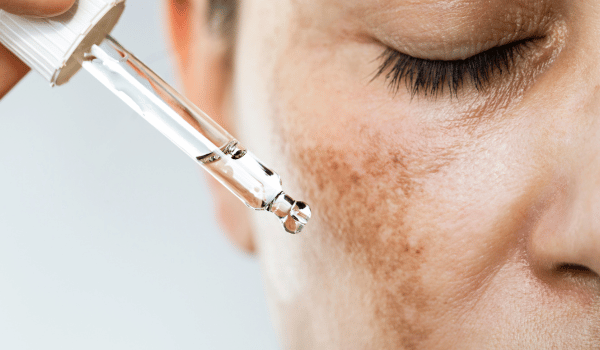The gold standard for the treatment of melasma
Hydroquinone is an organic substance that has to be produced in a laboratory. French chemists Pelletier and Cavetou discovered hydroquinone when they distilled quinic acid in 1820.
Creams containing hydroquinone have been used for many years as skin bleaching agents. When hydroquinone is mixed with isotretinoin and a steroid, it seems to work better for the treatment of melasma.
Hydroquinone is able to inhibit an enzyme that is responsible for making melanin, the brownish pigment that causes the skin to change to a brown colour. On top of that, it also destroys brown pigment cells and further fades brown spots or melasma. As a result, skin becomes less pigmented.
In 1982, hydroquinone was FDA-approved and deemed safe for the treatment of melasma, dark spots and uneven pigmentation. As a result, hydroquinone skin bleaching creams were sold over the counter and became very popular. But a few years later, the FDA became concerned about the safety of hydroquinone. This was because hydroquinone was given as a tablet to rats and, as a result, the rats developed cancer. The dosages given to the rats were extremely high. When you apply hydroquinone to your skin, the dosage is much, much lower and over 30 years of it being used as a cream, no reports of cancer were found.
In 2022, the FDA issued a few warning letters to companies that sell skincare products containing hydroquinone over the counter. This is because some people reported skin rashes and facial swelling when they used hydroquinone.
Extremely rarely, there is also a skin problem called ochronosis which is a permanent, blueish colour change of the skin, which can be caused by excessive use of hydroquinone. This condition was only prescribed in men from South Africa who applied hydroquinone to very large areas of their bodies, multiple times per day, over several years. On top of that, the skin care products these men used, contained resorcinol, another ingredient that can cause ochronosis.
For that reason, hydroquinone has to be prescribed to make sure that you can use it with the correct dosage and for the right amount of time. Under the supervision of a doctor, it is deemed a very safe treatment.
The Australian College for Gp’s recommends that you use hydroquinone cream infrequently and with small amounts at the beginning and then gradually titrate it up. Once your skin tolerates the cream well, you can use it once daily for 3 to 4 weeks. After that, you can use the cream twice weekly to maintain the result.
If your melasma takes longer to respond to the treatments, we sometimes treat it for up to 3 months.
Hydroquinone can be safely used in people with fair skin as well as in people with very dark skin.

